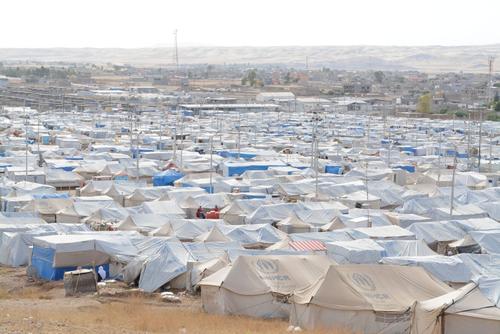At Kawargosk refugee camp in northern Iraq, Dr Muhammed Selim takes some time from his busy schedule of consultations to reflect on how he got to where he is today. Refugees – mostly mothers and their children – wait for their turn outside the consultation room, to see a doctor who understands their situation well. Having experienced firsthand the targeting of medical facilities and workers, and having stayed behind to treat the wounded in Syria until it was – by his own estimation – ‘too dangerous,’Muhammed was forced to make the same journey as the patients he now treats. He is now a refugee, treating fellow refugees.
Skilled Syrian medical staff
Muhammed is not the only one. At the health centre sit runs in Kawargosk and Darashakran camps in northern Iraq, Médecins Sans Frontières (MSF) relies on skilled staff who have crossed over from Syria as refugees. Nine Syrian doctors and 15 Syrian nurses are employed at the two camps.
MSF and the patients it treats are benefiting from the work of such doctors in Iraq and in several other countries.Throughout its history, in fact, the organisation has benefited from efforts of professionals who were determined to keep working, even after being displaced.
Contribution of Syrian doctors
To commemorate World Refugee Day, which falls on 20th June, we are highlighting the stories of three Syrian refugees working with us in Iraq, their contributions and their sacrifices. These are doctors who didn’t escape the fighting immediately, but tried to fulfill their medical duties in Syria until it was no longer possible, and who continue to contribute productively to their fellow refugees today. Despite being forced to flee, leaving behind much of their previous life and belongings, they have not left behind their medical mission.
There are currently over 225,000 Syrian refugees in Iraq, the vast majority of which are in the autonomous region of Kurdistan. In Erbil province, which hosts around 90,000 of these refugees, MSF opened projects in Kawargosk camp in September 2013, and Darashakran camp in March 2014, providing primary healthcare and mental health services. So far, over 50,000 consultations have been conducted. MSF also works in Dohuk province, which hosts over 100,000 refugees, providing primary healthcare, mental health and reproductive health services in Domeez camp, where it has conducted over 200,000 consultations. Meanwhile, the needs in the area are growing further, with the influx of internally displaced people to Kurdistan from other parts of Iraq following the recent escalation of violence. MSF is conducting mobile clinics to provide medical care, and is exploring additional ways of supporting the displaced populations.



